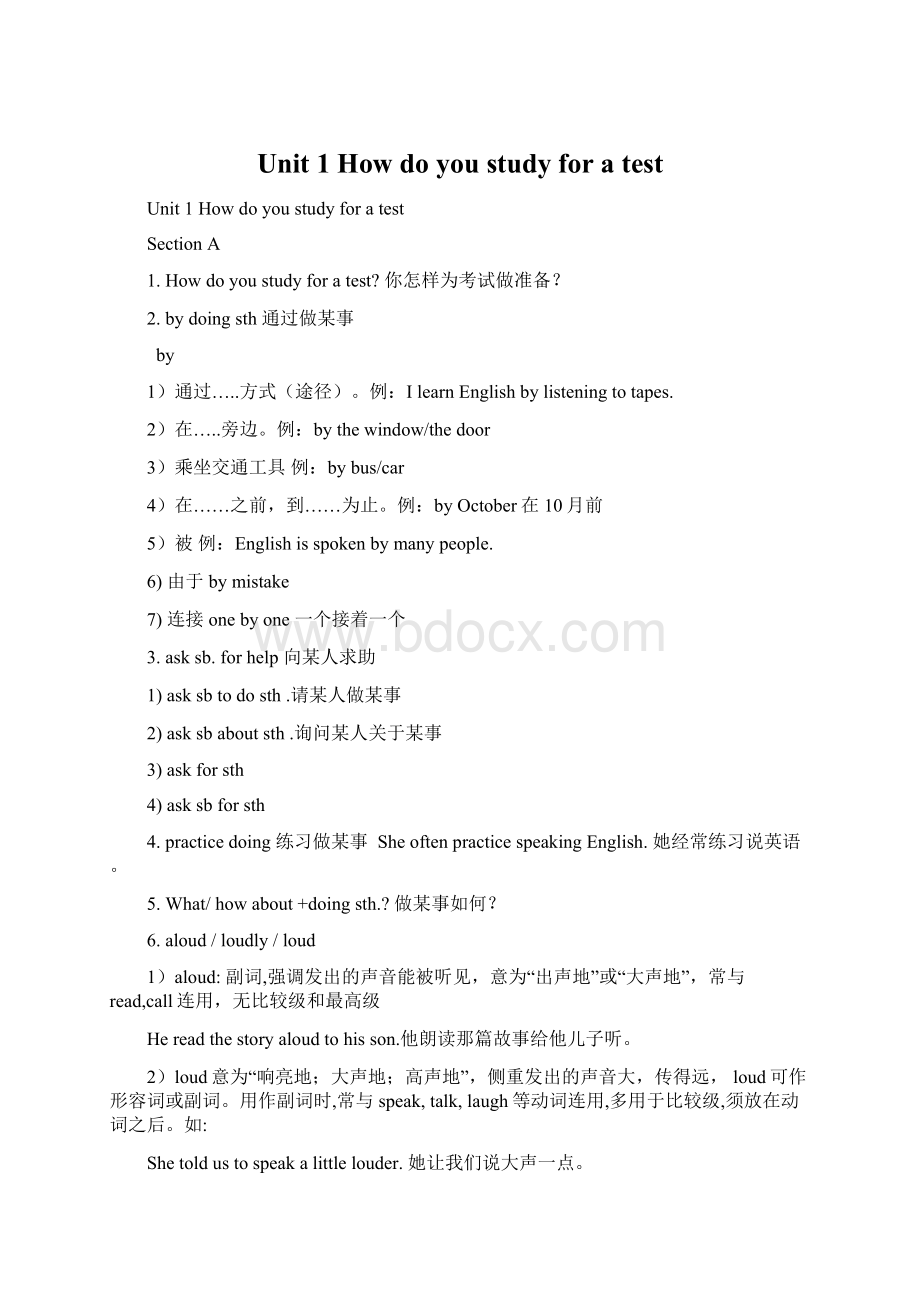Unit 1How do you study for a testWord格式文档下载.docx
《Unit 1How do you study for a testWord格式文档下载.docx》由会员分享,可在线阅读,更多相关《Unit 1How do you study for a testWord格式文档下载.docx(16页珍藏版)》请在冰豆网上搜索。

1)aloud:
副词,强调发出的声音能被听见,意为“出声地”或“大声地”,常与read,call连用,无比较级和最高级
Hereadthestoryaloudtohisson.他朗读那篇故事给他儿子听。
2)loud意为“响亮地;
大声地;
高声地”,侧重发出的声音大,传得远,loud可作形容词或副词。
用作副词时,常与speak,talk,laugh等动词连用,多用于比较级,须放在动词之后。
如:
Shetoldustospeakalittlelouder.她让我们说大声一点。
3)loudly是副词,与loud同义,有时两者可替换使用,但往往含有令人讨厌或打扰别人的意思,可位于动词之前或之后。
Hedoesnottalkloudlyorlaughloudlyinpublic.他不当众大声谈笑
7.talkabout谈论,议论,讨论
如:
Thestudentsoftentalkaboutmovieafterclass.学生们常常在课后讨论电影。
talktosb.===talkwithsb.与某人说话
8.提建议的句子:
1)What/howabout+doingsth.?
如:
What/Howaboutgoingshopping?
2)Whydon’tyou+dosth.?
Whydon’tyougoshopping?
3)Whynot+dosth.?
如:
Whynotgoshopping?
4)Let’s+dosth.如:
Let’sgoshopping
5)Shallwe/I+dosth.?
Shallwe/Igoshopping?
9.alot许多常用于句末如:
Ieatalot.我吃了许多。
10.aloud,loud与loudly的用法三个词都与"
大声"
或"
响亮"
有关。
1)aloud是副词,重点在出声能让人听见,但声音不一定很大,常用在读书或说话上。
通常放在动词之后。
aloud没有比较级形式。
2)loud可作形容词或副词。
3)loudly是副词,与loud同义,有时两者可替换使用,但往往含有令人讨厌或打扰别人的意思,可位于动词之前或之后。
Hedoesnottalkloudlyorlaughloudlyinpublic.他不当众大声谈笑。
11.Ihavelearnedalotthatway.
用那种方法,我已经学到了很多东西。
1)alot的用法:
修饰动词eg:
Thanksalot
修饰比较级eg:
Ifellalotbetter
2)thatway
用那种方法
12.It’stoohardtounderstandthevoice.听懂那些声音太难了。
too…to太…而不能常用的句型too+adj./adv.+todosth.
I’mtootiredtosayanything.我太累了,什么都不想说。
13.forexample(=forinstance)例如
14.Memorizingthewordsofpopsongsalsohelpedalittle.记流行歌曲的词也起作用。
动名词作主语谓语为第三人称单数
Swimmingisgoodforourhealth.
15.WeiMingfeelsdifferently.卫明有不同的感受。
16.Hefindswatchingmoviesfrustrating.他觉得看电影让人感到沮丧.
17.Sheaddedthathavingconversationswithfriendswasnothelpfulatall.
她又说和朋友对话根本没用。
18.not…atall一点也不根本不如:
Ilikemilkverymuch.Idon’tlikecoffeeatall.我非常喜欢牛奶。
我一点也不喜欢咖啡。
not经常可以和助动词结合在一起,atall则放在句尾
19.be/getexcitedaboutsth.=be/getexcitedaboutdoingsth.
=beexcitedtodosth.对…感兴奋如:
Iam/getexcitedaboutgoingtoBeijing.=IamexcitedtogotoBeijing.
我对去北京感到兴奋。
20.endup
1)endupdoingsth终止做某事,结束做某事如:
Thepartyendedupsinging.晚会以唱歌而结束。
2)endupwithsth.以…结束如:
Thepartyendedupwithhersinging.晚会以她的歌唱而告终。
SectionB
21.pronouncev.发音pronunciationn.发音
22.speaking与spoken
1)书面英语:
writtenEnglish;
口头英语:
spokenEnglish
2)说英语的:
English-speaking口语能力:
speakingskills
23.mistake(mistake---mistook----mistaken)
1)makeamistake/makemistakes犯错
2)mistakeAforB…把A错认为B
Imistookhimforhisbrother.我错把他认成了他的哥哥
3)makemistakesinsth.在某方面出错
4)makemistakes(in)doingsth.在干某事方面出错
5)bymistake错误地;
由于搞错
24.getthepronunciationright使发音准确
25.Idon’thaveapartnertopracticeEnglishwith.
我没有搭档一起练习英语。
26.firstofall首先
.tobeginwith一开始
lateron后来、随
27.Ifounditwashardtogetonwellwithhim.
hardtogetonwellwithhim.
Ifoundthewindowsclosed
wereclosed
28.inclass在课堂上
29.afraid
1)beafraidtodosth害怕做某事2)beafraidofdoingsth害怕做某事
3)beafraidofsb/sth害怕某人/某物
4)I’mafraid+that从句恐怕……
I’mafraidthatyouarewrong.恐怕是你错了。
5)I’mafraidso恐怕是这样I’mafraidnot恐怕不是这样
30.laughatsb=makefunofsb笑话;
取笑(某人)
31.takenotes做笔记,做记录
32.It’samazinghowmuchthishelped.令人惊奇的是这种方法对我帮助很大。
33.enjoydoingsth.喜欢做…乐意做…
enjoyoneself过得愉快如:
Heenjoyedhimself.他过得愉快。
34.Myteacherisveryimpressed.给老师留下了深刻的印象。
Selfcheck&Reading
35.writedown写下,记下
36.lookup(v+adv)查找,查询
37.nativespeaker说本族语的人
38.makeup组成,构成,编造,虚构,化妆,打扮
39.MostpeoplespeakEnglishasasecondlanguage.大多数人把英语作为第二语言讲。
asecond再一,又一
40.Howdowedealwithourproblem?
我们怎样处理我们的问题?
dealwith对待,处理。
侧重于方式方法。
在特殊疑问句中与how连用。
dowith对待,处理。
侧重于对象。
在特殊疑问句中与what连用。
What....dowith....?
=How....dealwith.....?
怎么处理
Idon’tknowhowtheydealwiththeproblem.
=Idon’tknowwhattheydowiththeproblem.我不知道他们如何处理这个问题。
41.unless假如不,除非。
.引导条件状语从句
Youwillfailunlessyouworkhard..假如你不努力你会失败。
Iwon’twriteunlesshewritesfirst.除非他先写要不我不写
42.worryaboutsb./sth.担心某人/某事
Motherworriedabouthissonjustnow.妈妈刚才担心他的儿子。
43.oneof+(the+形容词比较级)+名词复数形式…其中之一
Sheisoneofthemostpopularteachers.她是最受欢迎的教师之一。
44.It’s+形容词+(forsb.)todosth.(对于某人来说)做某事…
It’sdifficult(forme)tostudyEnglish.对于我来说学习英语太难了。
句中的it是形式主语,真正的主语是tostudyEnglish
45.decidetodosth.决定做某事
LiLeihasdecidedtogotoBeijing.李雷已经决定去北京。
46.beangrywithsb.对某人生气
Iwasangrywithher.我对她生气。
47.perhaps=maybe也许
48.goby(时间)过去如:
Twoyearswentby.两年过去了。
49.eachother彼此
50.regard…as…把…看作为….如:
TheboysregardedAnnaasafool.这些男孩把安娜看成傻瓜。
plainabout抱怨……
52.toomany 许多 修饰可数名词 如:
toomanygirls
toomuch 许多 修饰不可数名词如:
toomuchmilk
muchtoo 太 修饰形容词或副词如:
muchtoobeautiful
53.change… into… 将…变为…
Themagicianchangedthepenintoabook.这个魔术师将这本书变为一本书。
54.withthehelpofsb.=withone’shelp在某人的帮助下
withthehelpofLiLei==withLiLei’shelp在李雷的帮助下
55.compareAtoB 把A与B相比
CompareyoutoAnna,youarelucky.你和安娜相比,你是幸运的。
56.instead代替 用在句末,副词(字面上常不译出来)
insteadofsth./doingsth.代替,而不是用在句中,动词
LastsummerIwenttoBeijing.ThisyearI’mgoingtoShanghaiinstead.
去年夏天我去北京,今年我将要去上海。
Iwillgoinsteadofyou.我将代替你去。
Hestayedathomeinsteadofgoingswimming.他呆在家里而不是去游泳。
57.动词不定式
1)做定语—后置
ThebestwaytolearnEnglishisreadingaloud.
Thefastestwaytotravelisbyplane
2)与所修饰的名词构成动宾关系。
不定式修饰名词,动词短语后如有介词时不能省略
Ineedapentowritewith.
Idon’thaveapartnertopracticeEnglishwith.
Ineedsomepapertowriteon.
Idon’thavearoomtolivein.
TESTYOURSELF(Unit1)
笔试部分(95分)
Ⅴ.单项选择(15分)
()21.Childrenaresupposedtoenterintothiscinemawith_______adult.
A.aB.anC.theD./
()22.Ihearyou’lltakepartintheEnglishcontest.
You’reright.Ithinkit’sagreat________forme.
A.solutionB.challengeC.troubleD.duty
()23.Marywasveryangry_____mebecauseItoldJimhersecretyesterday.
A.withB.toC.inD.of
()24.Playingwithfire_____dangerous.
A.isB.wasC.beD.willbe
()25.Ifound______veryeasytolearnEnglishwellifyouputyourheartintoit.
A.thatB.oneC.itD.this
()26.Therainwill______ourplanforapicnic.
A.faceB.influenceC.solveD.lose
()27.CouldyoutellmewhattimetheplaneleavesTaiyuanforBeijing?
I’mafraidyouneedto______ontheInternet.
A.lookforitB.lookatitC.lookitoverD.lookitup
()28.Ithinkthebesttime_____toHainanwasinsummer.
A.travelingB.travelC.traveledD.totravel
()29.Mrs.Wangfoundhislittleson______withhistoysalonewhenshearrivedhome.
A.playsB.toplayC.playD.playing
()30.—CanIhelpyou?
—Thanks.ButIthinktheboxis______heavyforyou______carry.
A.enough;
toB.notenough;
toC.too;
toD.too;
notto
()31.—Iheardtheylostthegame.
—Yeah.Wewereall_______whenwesawthe________result.
A.frustrated;
frustratedB.frustrating;
frustrating
C.frustrated;
frustratingD.frustrating;
frustrated
()32.Youcan’ttouchanythinghere_________youaretoldto.
A.afterB.unlessC.whileD.since
()33.—Ihavenoidea_______withtheproblem.
—Idon’tknoweither.You’dbetteraskourteacherforhelp.
A.howdoingB.howtodealC.whatdoingD.whattodeal
()34.—______haveyoumadesuchgreatprogress?
Ihavemadeitby______agoodplan.
A.When;
makingB.When;
make
C.How;
makingD.How;
make
()35.—YoucangetatutortohelpyouwithyourEnglish.
______
A.Ican’t.B.That’sagoodidea!
C.No.I’mreallysorry.D.It’sverykindofyou.
Ⅵ.完形填空(10分)
Agroupoffifteenvolunteerscametoourlittlemountainvillagelastmonth.Wewere__36__anuninterestingandquietlifebeforetheycame.Whentheyappearedattheendoftheroadleadingtothevillage,we_37___theirloudsongsandhappylaughter.Thevillagechildrenran___38__themandformedabigprocession(队伍).Onthefirstday,theyhada(n)__39___withtheheadofthevillageintheafternoon,andlaterintheeveningwithallthevillagers.
Theyfetchedalotofthingssuchasclothes,food,andschoolthings.Duringthedaystheystayedin40___village,theydidalotofthingsforus.Theyhelpedtheteachersfixupthedesksandchairsinourvillage__41___.Theydug(挖)afewnewwells(水井)___42___wecouldgetmorecleanwater.They___43___exercisebooksandpencilstotheschoolchildrenandholdapartyintheeveningstoteachthechildrensongsand_44___.Theyalsotalkedwithusaboutscienceandmanyotherthings.
Lifeinourvillagebecamenewerand____45___.Everyonehadagoodtime.Itwasfuntowatchthemwalkamongcrowdsofchildren,andevencuriousadults.
()36.A.finding
()37.A.answered
()38.A.for
()39.A.talk
()40.A.his
()41.A.market
()42.A.because